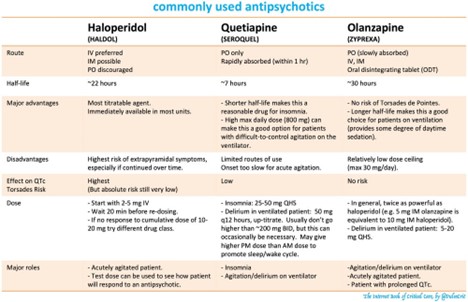A nurse is caring for a client who has severe manifestations of schizophrenia and is medicated PRN for agitation with haloperidol. The nurse should assess the client for which of the following adverse effects?
Bleeding
Cataracts
Dysrhythmias
Pancreatitis
The Correct Answer is C
A. Bleeding:
Explanation: Bleeding is not a common adverse effect of haloperidol, which is an antipsychotic medication used to treat conditions like schizophrenia. Haloperidol primarily works on the central nervous system and is not known to directly cause bleeding issues.
B. Cataracts:
Explanation: Cataracts are not a common adverse effect of haloperidol either. While long-term use of some antipsychotic medications can lead to metabolic and endocrine disturbances, which might indirectly impact eye health, cataracts are not a direct and immediate concern with haloperidol use.
C. Dysrhythmias:
Explanation: Correct Answer. Haloperidol has the potential to cause cardiac-related adverse effects, including dysrhythmias (irregular heart rhythms). This is a particular concern in individuals who are predisposed to heart conditions or have other risk factors. The medication can prolong the QT interval, which is a measure of the time it takes for the heart's electrical system to recharge between beats. Prolonged QT interval can lead to serious and potentially life-threatening arrhythmias.
D. Pancreatitis:
Explanation: Pancreatitis is not a common adverse effect of haloperidol. Pancreatitis typically involves inflammation of the pancreas and can be caused by various factors such as gallstones, alcohol consumption, and certain medications. Haloperidol is not known to directly cause inflammation of the pancreas.

Nursing Test Bank
Naxlex Comprehensive Predictor Exams
Related Questions
Correct Answer is ["A","B","C","D"]
Explanation
A. Lithium: Lithium is a mood stabilizer commonly used in the treatment of bipolar disorder. It helps to control mood swings and prevent the recurrence of manic and depressive episodes.
B. Carbamazepine: Carbamazepine is an anticonvulsant medication that has been found effective in managing mood swings in bipolar disorder. It can help stabilize mood and prevent manic episodes.
C. Valproate (Valproic acid or Divalproex sodium): Valproate is another anticonvulsant medication that is used as a mood stabilizer in bipolar disorder. It can help control manic and mixed episodes.
The following options are not used to treat bipolar disorder:
D. Paroxetine: SSRIs, including paroxetine, carry a risk of inducing mania or hypomania in individuals with bipolar disorder. This risk is why these medications are usually avoided or used cautiously, always in conjunction with a mood stabilizer like lithium, valproate, or atypical antipsychotics. Before initiating paroxetine, it’s crucial that the client is stabilized with a mood stabilizer to minimize the risk of mood switching (i.e., moving from depression to mania or hypomania).
E. Donepezil: Donepezil is a medication used to treat Alzheimer's disease and other forms of dementia. It is not used to treat bipolar disorder.
Correct Answer is B
Explanation
While the behavior may occupy the client's time and attention, the primary motivation behind OCD-related compulsions is not to engage in meaningful tasks but rather to alleviate anxiety caused by obsessive thoughts.
B. Decrease anxiety to a tolerable level.
Explanation: Individuals with obsessive-compulsive disorder (OCD) often engage in compulsive behaviors, such as cleaning, organizing, or checking, as a way to reduce the anxiety caused by their obsessive thoughts. In this scenario, the client's constant picking up after others is likely a compulsive behavior that serves the purpose of decreasing their anxiety to a tolerable level. The act of tidying up may temporarily alleviate the distress caused by obsessive thoughts related to cleanliness, order, or potential harm.
C. Manipulate and control others' behaviors.
The behavior described does not inherently indicate a desire to manipulate or control others. The behavior is driven by the client's internal anxiety rather than an intention to control external factors.
D. Limit the amount of time available to interact with others.
The behavior is more closely related to managing anxiety than limiting social interactions. OCD-related behaviors are driven by the need to reduce distress, not necessarily to avoid interacting with others.
Whether you are a student looking to ace your exams or a practicing nurse seeking to enhance your expertise , our nursing education contents will empower you with the confidence and competence to make a difference in the lives of patients and become a respected leader in the healthcare field.
Visit Naxlex, invest in your future and unlock endless possibilities with our unparalleled nursing education contents today
Report Wrong Answer on the Current Question
Do you disagree with the answer? If yes, what is your expected answer? Explain.
Kindly be descriptive with the issue you are facing.
